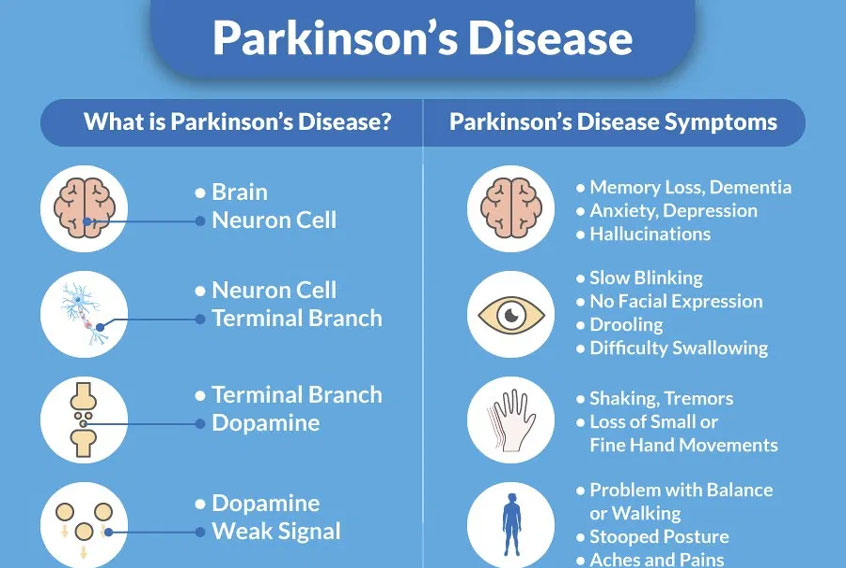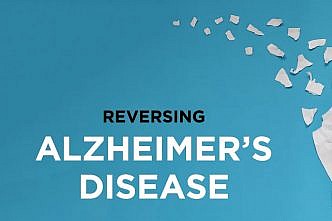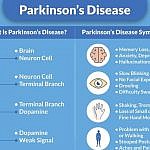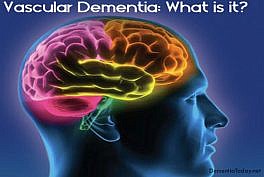Parkinson’s Disease Dementia

Parkinson’s dementia is a condition that some people can experience as their Parkinson’s progresses. It a ects thinking and memory and can have a big impact on di erent aspects of life.
This information sheet looks at the symptoms and causes of Parkinson’s dementia and provides some practical advice on how life can be made easier for the person a ected and their family, friends and carers.
What is dementia?
Dementia symptoms are caused by a significant loss of brain function. There are diffierent forms of the condition and each person will experience dementia in their own way.
Some people will develop dementia after living with Parkinson’s for some time. When someone has Parkinson’s motor symptoms for at least a year before experiencing dementia, this is known as Parkinson’s dementia.
There is a similar condition called dementia with Lewy bodies. This is diagnosed when someone has the symptoms of dementia either before or at the same time as developing Parkinson’s-like problems with movement (called motor symptoms). In some cases, no motor symptoms may develop at all.
What are the symptoms of Parkinson’s dementia?
Symptoms can include forgetfulness, slow thought processes and difficulty concentrating. This can make communication hard and finding words and names or following conversations can be a problem.
Some people find it increasingly difficult to make decisions, plan activities and solve problems. This can make everyday activities such as dressing, cooking or cleaning increasingly hard.
People can also experience changes in their appetite, energy levels and sleeping patterns, so they may find themselves sleeping more during the day, or becoming less engaged with what’s going on around them. A lack of motivation or interest in things they previously enjoyed can also be a symptom.
Problems such as anxiety, depression or irritability can become an issue because of dementia. Some people may also find it difficult to control their emotions and experience sudden outbursts of anger or distress, although these problems are not common.
Some people with Parkinson’s dementia might also develop visual hallucinations and delusions.
Some of the symptoms of Parkinson’s dementia are similar to those caused by other health issues. For example, mental health issues such as depression can mimic dementia. Side effects from medication, or medical problems such as an infection may be the cause of symptoms similar to dementia, such as memory problems. Symptoms caused by medication or infections can be treated effectively.
It’s important to speak to your GP, specialist or Parkinson’s nurse (if you have one) if you think you have these symptoms. They will be able to give you advice on what to do next.
Parkinson’s dementia
What causes Parkinson’s dementia?
We still don’t fully understand why some people with Parkinson’s get dementia and it isn’t entirely possible to predict who it will affect. But there are factors that put someone more at risk. Age, for example. It is rare that someone with Parkinson’s under the age of 65 will develop dementia.
If someone with Parkinson’s is experiencing hallucinations or delusions early on in their condition, this also suggests an increased risk of developing dementia.
If someone has been diagnosed with Parkinson’s later in life, has had Parkinson’s for a long period of time or has a family member with dementia, this can increase their risk of developing dementia.
How is Parkinson’s dementia diagnosed?
A specialist will diagnose this condition based on the patient’s symptoms, their medical history and the results of a medical examination. There is no specific blood test for this condition, but tests of memory and thinking will help confirm what the problem is.
The specialist may also talk to your spouse or family members to confirm the problems that issues such as memory difficulties are causing on a day-to-day basis.
It is important that other problems, such as severe depression, are excluded before the diagnosis of Parkinson’s dementia can be considered.
What can be done to help?
As with Parkinson’s, the symptoms of dementia can’t be cured, but they can be treated.
Reviewing your current medication
If someone with Parkinson’s has been diagnosed with dementia, the next step is for their specialist or Parkinson’s nurse to have a look at what medication they’re taking.
This is because some of the side effects of Parkinson’s medication can make the symptoms of dementia worse.
However, reducing the dose or withdrawing these drugs may mean that the Parkinson’s symptoms aren’t controlled as well as before.
For this reason, treating dementia often requires a compromise between managing the physical problems caused by Parkinson’s and managing the issues caused by dementia.
Dementia medications
Some people with Parkinson’s may be suitable for dementia medication. This is likely to depend on the stage of dementia and the person’s health. It may involve further memory and cognitive testing to see whether there is any change in symptoms over time.
These medications can’t cure or slow down the condition’s progress, but they can treat symptoms of dementia, such as hallucinations, delusions and confusion. Speak to your healthcare professional about taking these medications alongside your Parkinson’s medication.
Some people with Parkinson’s dementia can experience behavioural problems, such as sudden outbursts of anger. Medications called ‘antipsychotics’ or ‘neuroleptics’ might be considered to treat these symptoms. Specialists usually avoid prescribing neuroleptics, but in some cases, if behavioural symptoms are becoming especially problematic, very low doses of these medications may have to be used. If this medication is prescribed, the healthcare professionals in charge of a person’s care should monitor the situation carefully.
Any medication you take will need to be monitored.
It’s important to discuss the potential risks or side effects of any drug with your specialist so you can weigh these up against the problems you might have if you don’t take them.
If you have any questions about medication for Parkinson’s dementia, speak to your GP, specialist or Parkinson’s nurse for more advice and information.
Support from professionals
Medication can be helpful, but it’s also useful for people to get treatment from a wide range of healthcare professionals. People such as physiotherapists, occupational therapists, dietitians and speech and language therapists can help the person with dementia and those supporting them.
You can be referred to these health professionals through your GP, specialist or Parkinson’s nurse. In some areas, you might be able to refer yourself at the local hospital or community health clinic.
Legal matters
If you have been diagnosed with early stage dementia, you may want to make some important decisions about things like your finances or Will, and what sort of healthcare and social care you’d like in the future. You may also want to choose someone you trust to handle your affairs, and make this a legal agreement, such as a Power of Attorney. For more information and advice, you can contact the Office of the Public Guardian (England and Wales), the Office of Care and Protection (Northern Ireland) or the Office of the Public Guardian (Scotland). Contact details are listed on page 6 of this information sheet.
Caring for someone with dementia
If someone becomes less able because of their dementia, it may be necessary for their family or friends to start helping with things such as shopping, housework or cooking. If this is the case, the person may be able to apply for an Attendance Allowance or Disability Living Allowance, which will help provide some financial support.
Practical advice
If you are caring for someone with dementia, there are some practical things you can do that can help reduce their agitation or confusion and make life a bit easier:
- Keep to a daily routine as much as you can to help them remember when certain things like meal times will happen.
- Try to use familiar objects and phrases.
- Avoid unfamiliar environments – these can be quite stressful.
- Encourage someone with dementia to keep engaging and interacting with people. Hobbies are also a great way to keep memory and thinking as active as possible.
Helping with communication
Difficulties with communication can be upsetting and frustrating for the person with dementia and for those around them. But there are some basic things you can do to make life a little bit easier.
The following information has been provided by the Alzheimer’s Society.
General advice
- Listen carefully to what a person with dementia says.
- Make sure you have their full attention before you speak.
- Pay attention to body language.
- Speak clearly.
- Consider whether any other factors are affecting their communication.
- Use physical contact to reassure the person.
- Show respect and keep in mind they have the same feelings and needs as they had before developing dementia.
Listening skills
- Try to listen carefully to what they are saying, and give them plenty of encouragement.
- If a person with dementia has difficulty finding the right word or finishing a sentence, ask them to explain in a different way. Listen out for clues.
- If you find their speech hard to understand, use what you know about them to interpret what they might be trying to say. But always check back with them to see if you are right – it’s infuriating to have your sentence finished incorrectly by someone else.
- If someone is feeling sad, let them express their feelings without trying to ‘jolly them along’.
Sometimes, the best thing to do is to just listen, and show that you care.
Attracting the person’s attention
- Try to catch and hold their attention before you start to communicate.
- Make sure they can see you clearly.
- Make eye contact. This will help them focus on you.
- Try to minimise competing noises, such as the radio, TV, or other people’s conversation.
Using body language
- Someone with dementia will read your body language. Agitated movements or a tense facial expression may upset them, and can make communication more difficult.
- Be calm and still while you communicate. This shows them that you are giving them your full attention, and that you have time for them.
- Never stand over someone to communicate – it can feel intimidating. Instead, drop below their eye level. This will help them feel more in control of the situation.
- Standing too close to someone can also feel intimidating, so always respect their personal space.
- If someone is struggling to speak, pick up cues from their body language. The expression on their face, and the way they hold themselves and move about, can give you clear signals about how they are feeling.
Speaking clearly
- As their dementia progresses, a person will become less able to start a conversation, so you may have to start taking the initiative.
- Speak clearly and calmly. Avoid speaking sharply or raising your voice, as this may distress them even if they can’t follow the sense of your words.
- Use simple, short sentences.
- Processing information will take someone longer than it used to, so allow enough time. If you try to hurry them, they may feel pressured.
- People with dementia can become frustrated if they can’t find the answer to questions, and they may respond with irritation or even aggression. If you have to, ask questions one at a time, and phrase them in a way that allows for a ‘yes’ or ‘no’ answer.
- Try not to ask the person to make complicated decisions. Too many choices can be confusing and frustrating.
- If the person doesn’t understand what you are saying, try getting the message across in a different way rather than simply repeating the same thing.
- Humour can help to bring you closer together, and is a great pressure valve. Try to laugh together about misunderstandings and mistakes – it can help.
Whose reality?
- As dementia progresses, fact and fantasy can become confused. If someone says something you know isn’t true, try to find ways around the situation rather than responding with a fat contradiction.
- Always avoid making the person with dementia feel foolish in front of other people.
Physical contact
- Even when conversation becomes more difficult, being warm or affectionate can help carers to remain close to their loved ones, or for the person with dementia to feel supported.
- Communicate your care and affection by the tone of your voice and the touch of your hand.
- Don’t underestimate the reassurance you can give by holding or patting their hand or putting your arm around them, if it feels right.
Show respect
- Make sure no-one speaks down to the person with dementia or treats them like a child, even if they don’t seem to understand what people say. No one likes being patronised.
- Try to include them in conversations with others. You may find this easier if you adapt the way you say things slightly. Being included in social groups can help a person with dementia to keep their sense of identity. It also helps to protect them from feeling excluded or isolated.
- If you are getting little response from someone with dementia, it can be very tempting to speak about them as if they weren’t there. But disregarding them in this way can make them feel very cut off, frustrated and sad.
Other causes of communication difficulty
It is important to bear in mind that communication can be affected by other factors in addition to dementia – for example:
- pain, discomfort, illness or the side-effects of medication. If you suspect this might be happening, talk to the person’s GP at once problems with sight, hearing or ill-fitting dentures. Make sure the person’s glasses are the correct prescription, that their hearing aids are working properly, and that their dentures fit well and are comfortable
- Parkinson’s symptoms can cause difficulties with communication
Dr Iracema Leroi,
Consultant Psychiatrist for the Elderly and Honorary Senior Lecturer with a special interest in mental health in Parkinson’s, University of Manchester
Professor Ian McKeith,
Professor of Old Age Psychiatry, Institute for Ageing and Health, Newcastle University







